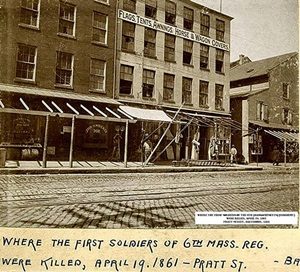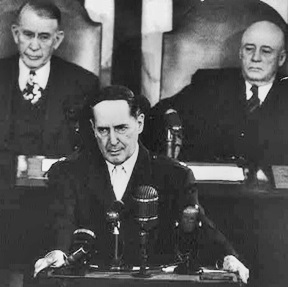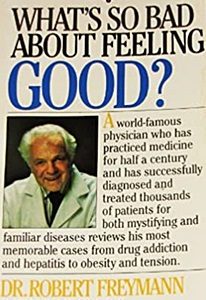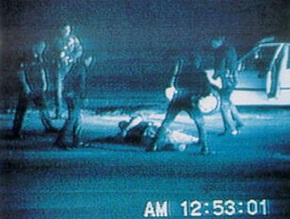On April 19…
“I have great respect for human life. My decision to take human life at the Murrah Building – I did not do it for personal gain. I ease my mind in that. I did it for the larger good.”
~Timothy McVeigh

1775 – Picking up where we left the story yesterday …
When 700 British troops arrived at Lexington at about 5:00 a.m., John Adams and John Hancock – the two men they had hoped to capture – had already fled to Philadelphia.
The British troops marched into Lexington to find 77 armed minutemen under Captain John Parker waiting for them on the town’s common green. British Major John Pitcairn ordered the outnumbered Patriots to disperse, and after a moment’s hesitation the Americans began to drift off the green.
Suddenly, the “shot heard ’round the world” was fired at (Old) North Bridge, just outside of Lexington, by an undetermined gun, and a cloud of musket smoke soon covered the green.
When the brief Battle of Lexington ended, eight Americans lay dead or dying and 10 others were wounded. Only one British soldier was injured, but the American Revolution had begun.

1809 – Former President Thomas Jefferson wrote up a contract for the sale of an indentured servant named John Freeman to newly sworn-in President James Madison.
Jefferson had purchased Freeman for $400 from William Baker on July 3, 1804. When Jefferson was president, Freeman was his dining room servant at the White House.
The original hand-written contract for Freeman’s sale is now housed at the Library of Congress.
In the exhibit, it is noted with irony that Jefferson, America’s preeminent revolutionary, wrote the agreement on the anniversary of the Battle of Lexington, the event that launched the war to end America’s servitude to England.

1861 – The first blood of the Civil War was shed on Pratt Street in Baltimore, MD when a secessionist mob attacked soldiers of the 6th Massachusetts Regiment who were bound for Washington, D.C.
Four soldiers and 12 rioters were killed. As a result Baltimore became an occupied city by Union forces for the duration of the Civil War.

1897 – Fifteen runners started the first Boston Marathon (24.5 miles) but only 10 made it to the finish line.
John J. McDermott of New York won the inaugural event with a time of 2:55:10.
A measured distance of 24.5 miles from Metcalf’s Mill in Ashland to the Irvington Oval in Boston was selected, but the marathon’s distance was changed in 1908 in accordance with Olympic standards to its current length of 26 miles, 385 yards.

1904 – The Great Toronto Fire destroyed a large section of the city’s downtown business district.
Flames were first seen rising from the elevator shaft of the E & S Currie Limited’s neck wear factory at 8:04 p.m. The exact cause of the fire was never determined, but a faulty heating stove or an electrical problem is suspected.
The city’s 200 firefighters called on crews from neighboring towns for help, but bitter cold, high winds, and a lack of adequate water pressure made fire hoses ineffective.
The fire destroyed 118 buildings, leaving almost half of the city’s businesses in ruins. Surprisingly, the fire claimed only one victim; John Croft, an explosive expert, who died while clearing the ruins from the fire.

1943 – Jewish resistance arose within the Warsaw Ghetto in German-occupied Poland. Jews opposed Nazi Germany’s final effort to transport the remaining Ghetto population to Treblinka.
On this date, the Ghetto refused to surrender to the police commander SS-Brigadeführer Jürgen Stroop, who then ordered the burning of the Ghetto, block by block, ending on May 16.
A total of 13,000 Jews died, about half of them burnt alive or suffocated. German casualties are not known, but were not more than 300. It was the largest single revolt by Jews during World War II.

1951 – Gen. Douglas MacArthur, relieved of his command by President Harry S. Truman, made his last official appearance in a farewell address to the U.S. Congress.
During his address, he defended his side of his disagreement with Truman over the conduct of the Korean War. His speech was interrupted by fifty ovations.
MacArthur ended the address by saying:
“I am closing my 52 years of military service. When I joined the Army, even before the turn of the century, it was the fulfillment of all of my boyish hopes and dreams. The world has turned over many times since I took the oath on the plain at West Point, and the hopes and dreams have long since vanished, but I still remember the refrain of one of the most popular barrack ballads of that day which proclaimed most proudly that “old soldiers never die; they just fade away”.
And like the old soldier of that ballad, I now close my military career and just fade away, an old soldier who tried to do his duty as God gave him the light to see that duty.”
Aftermath: MacArthur received public adulation, which led to expectations that he would run for president. MacArthur carried out a speaking tour in 1951–52 attacking the Truman administration for “appeasement in Asia” and for mismanaging the economy.
However, he felt uncomfortable actively campaigning for the Republican nomination, and hoped that at the Republican convention, a deadlock would ensue between Senator Robert Taft (Ohio) and General Dwight D. Eisenhower, which would end with the GOP nominating him as the best compromise.
MacArthur’s unwillingness to campaign for the presidency seriously hurt his ability to win the nomination. In the end, MacArthur endorsed Senator Taft.

1963 – Johnny Cash released Ring of Fire.
The single – written by his future wife June Carter and Merle Kilgore – became one of the biggest hits of Cash’s career, staying at #1 on the Billboard Country chart for seven weeks and reaching #17 on the Billboard Hot 100.
In June 2014, Rolling Stone magazine ranked the song #27 on its list of the 100 greatest country songs of all time.

1966 – The Beatles recorded Doctor Robert.
Dr. Robert (according to Paul McCartney) was Dr. Robert Freymann who ran a clinic on Manhattan’s East 78th Street. Known as Dr. Robert or the “Great White Father,” Freymann had a reputation for giving vitamin B-12 shots, which also happened to contain a massive dose of amphetamines, to celebrities.
“I have a clientele that is remarkable, from every sphere of life,” Freymann once said in an interview. “I could tell you in ten minutes probably 100 famous names who come here.”
Freymann continued his practice until he was expelled from the New York State Medical Society in 1975 for malpractice. His book, What’s So Bad About Feeling Good?, was published in 1983. He died in 1987.

1985 – The FBI and the Bureau of Alcohol, Tobacco, and Firearms positioned 300 federal agents around the compound of The Covenant, the Sword, and the Arm of the Lord in Elijah, Missouri.
Over the next three days, the agents negotiated a peaceful surrender by members of the group.
The CSA was an anti-Semitic organization which believed that doomsday was imminent, and they trained their members in paramilitary operations. They were observed by the government but not taken too seriously until July 1983 when the group published a manifesto called A.T.T.A.C.K. (Aryan Tactical Treaty for the Advancement of Christ’s Kingdom), which declared a war against the government.
CSA founder James Ellison and seven other members were charged in federal court with illegal weapons possession and racketeering. In September 1985, they were all sentenced to lengthy federal prison terms.
Aftermath: Richard Snell, a former member of the group, was convicted for the killing of two people in Arkansas between November 3, 1983 and June 30, 1984.
Snell was sentenced to death for one of the murders, and executed by lethal injection on April 19, 1995 – the date Timothy McVeigh carried out the Oklahoma City bombing, which destroyed the Alfred P. Murrah Federal Building.
Snell had been accused of plotting to bomb the Murrah Building in the 1980s.

1993 – At Mount Carmel in Waco, Texas, the Federal Bureau of Investigation launched a tear-gas assault on the Branch Davidian compound, ending a tense 51-day standoff between the federal government and an armed religious cult led by David Koresh, a self-proclaimed “final prophet”.
In the course of the advance on the compound, the church building caught fire in circumstances that are still disputed. Barricaded inside the building, 79 Branch Davidians perished in the ensuing blaze; 25 of these victims were children under the age of 16.
According to the FBI, Steve Schneider, Koresh’s right-hand man, who (in their words, not mine) “probably realized he was dealing with a fraud,” shot and killed Koresh and then committed suicide with the same gun.
The medical examiner reported that although federal law enforcement personnel fired no shots that day, 20 people, including five children under the age of 14, had been shot, and a three-year-old had been stabbed in the chest.
What’s In A Name Koresh was born Vernon Howell, but convinced “through conversations with God” that Mount Carmel was the earthbound site of the Davidic kingdom (referring to the lineage of King David), he chose a new name.
David after King David, and Koresh after the biblical name (Kurosh) of Cyrus the Great, a Persian king who was named a messiah for freeing Jews during the Babylonian Captivity.

1994 – A Los Angeles jury awarded $3.8 million (and $1.7 million in attorney’s fees) to Rodney King for the beating he suffered at the hands of the Los Angeles Police Department officers following a high-speed car chase in March 1991.

1995 – A massive truck bomb exploded outside the Alfred P. Murrah Federal Building in Oklahoma City, Oklahoma. The blast collapsed the north face of the nine-story building, instantly killing more than 100 people and trapping dozens more in the rubble.
Emergency crews raced to Oklahoma City from across the country, and when the rescue effort finally ended two weeks later the death toll stood at 168 people killed, including 19 young children who were in the building’s day-care center at the time of the blast.
One of the largest manhunts in U.S. history resulted in the capture of Timothy McVeigh, a 27-year-old former U.S. Army soldier who matched an eyewitness description of a man seen at the scene of the crime. On the same day, Terry Nichols, an associate of McVeigh’s, surrendered in Herington, Kansas.
McVeigh, died from a lethal injection at the U.S. penitentiary in Terre Haute, Indiana.
Nichols was later found guilty on one count of conspiracy and eight counts of involuntary manslaughter, and was sentenced to life in prison.

2005 – Following the death of Pope John Paul II, Cardinal Joseph Ratzinger was elected as Pope and took the name Benedict XVI.
He served as head of the Catholic Church and sovereign of the Vatican City State until – citing his deteriorating strength and the physical and mental demands of the papacy – his resignation at the age of 85 in 2013.
His retirement was unexpected as Benedict was the first pope to resign without external pressure since Celestine V in 1294.

2012 – Levon Helm died due to complications from throat cancer at the age of 71.
The drummer, extraordinary mandolin player, and primary lead vocalist with The Band, Helm sang lead on many of their most well-known songs; Up On Cripple Creek, The Weight, The Night They Drove Old Dixie Down, When I Paint My Masterpiece and Ophelia.
Helm also had a successful career as an actor. He starred as Loretta Lynn’s father in Coal Miner’s Daughter, as Captain Jack Ridley in The Right Stuff, and as a Tennessee firearms expert in Shooter.
International Factoid: Helm was born in Arkansas and was the only American in The Band. The other members; Rick Danko, Robbie Robertson, Richard Manuel and Garth Hudson were all born in Canada.

2013 – Boston Marathon bombing suspect Tamerlan Tsarnaev was killed in a shootout with police.
The exact sequence of events remains clouded in confusion, as do key details. According to police, Tsarnaev’s younger brother, Dzhokhar, ran him over with an SUV and dragged him with the vehicle for 20 feet, although emergency physicians said that he did not appear to have been run over. According to paramedic Michael Sullivan, who treated him after the shootout, Tsarnaev angrily resisted efforts by paramedics to treat him as he was being driven to the hospital, lifting himself from the stretcher and screaming loudly.
He was taken to Beth Israel Deaconess Medical Center, where, despite efforts to revive him by emergency medical personnel, he was pronounced dead from several critical injuries, massive blood loss, and cardiac and respiratory arrest
His brother was later captured hiding in a boat inside a backyard in the suburb of Watertown.

2017 – Former NFL star Aaron Hernandez took his own life at the age of 27.
Five days after being acquitted of a 2012 Boston double homicide, correction officers found Hernandez – convicted in 2015 for the murder of Odin Lloyd – hanging by his bedsheets from a window in his cell at the Souza-Baranowski Correctional Center in Lancaster, Massachusetts.
A posthumous examination of his brain showed he had such a severe form of the degenerative brain disease C.T.E. (chronic traumatic encephalopathy) that the damage was similar to that of players well into their 60s.
It was, a lawyer for his family said, in announcing the findings, “the most severe case they had ever seen in someone of Aaron’s age.”
Compiled by Ray Lemire ©2020 RayLemire.com / Streamingoldies.com. All Rights Reserved.